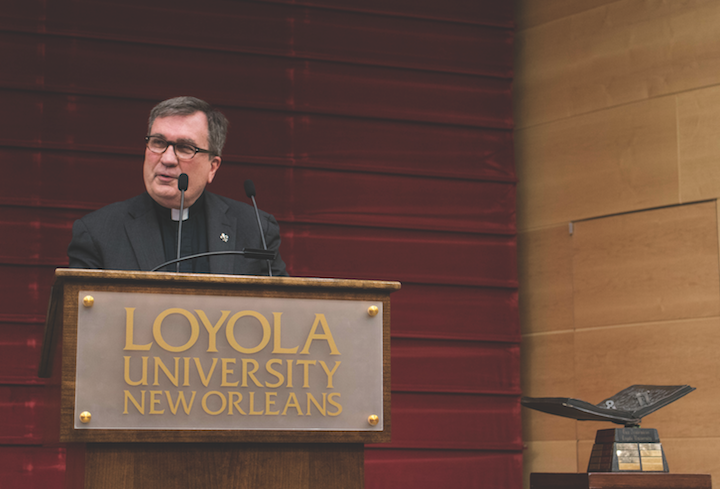Opinion: Disagreements should be civil but robust – Wildes
The Rev. Kevin Wildes, S.J. speaks to faculty and staff at the spring convocation in Nunemaker Hall, Jan. 13. Wilde gave a statement after a conflict between two student organizations.
February 6, 2017
As a university — indeed as a Catholic, Jesuit university founded on humanist principles — Loyola University New Orleans has a responsibility to explore complicated social issues and dialogue with the culture in which it exists. This dialogue can sometimes be uncomfortable. And yet, we engage in such discussions with confidence in our community and the university’s Jesuit and Catholic mission.
At Loyola University New Orleans, we provide an outstanding academic education grounded in the liberal arts and sciences. We aim to provide our students with a strong moral and ethical framework with an emphasis on Catholic social teaching. We also help them to advance their critical thinking skills so that they approach issues of the day with discernment. In the classroom, in the residence halls, in student activities, and in athletic efforts, we foster an environment of care and respect for others.
This is also true when it comes to artistic endeavors. For thousands of years, arts and literature have explored issues of the day and examined the human condition, exploring societal values and drawing special attention to human suffering. Performances of The Vagina Monologues are not new to university settings; in fact, there were nine such performances at Catholic universities in 2016. While the performances held at Loyola University New Orleans are not part of our university’s theater program, they are produced, directed, and performed by a group consisting entirely of Loyola students and held in the Women’s Resource Center.
The Women’s Resource Center at Loyola University New Orleans strives to create a supportive and inclusive campus environment through programming, services, and advocacy. It is the intention of the Loyola students who are performing in this production to shed light on the important issue of violence against women and to foster dialogue regarding women’s issues.
Last week, when I became aware that proceeds from this year’s production of The Vagina Monologues were to be donated to Planned Parenthood, I approached the Women’s Resource Center adviser and requested that the group consider redirecting these funds to a different charity — one that provides the women’s health services they seek to support and does so in a way that is consistent with the university’s mission and Catholic beliefs in the sanctity of life.
I recognized that this request would undoubtedly create some debate — as dialogue over important issues that we all face as faith-filled human beings is rarely ever easy. However, any social media attacks in regards to this issue by student groups, supporters, and others must be addressed and immediately discontinued. At Loyola University New Orleans, we encourage our students to raise important questions about difficult issues within the context of our Catholic, Jesuit values. This performance of The Vagina Monologues is not meant to be a celebration of its content but rather a starting point in the discussion of serious issues facing women and larger issues of morality.
In today’s internet culture, it is easy to engage with others and the world while forgetting the real human beings affected by our statements. We all face a constant risk of cyber-bullying. We must, as a community, demonstrate mutual respect for disparate beliefs and ideas. We must work hard to foster tolerance, create understanding, and maintain good relationships and respectful communication. I am asking that the leaders of both student groups and their advisers meet to discuss and create some rules of engagement regarding how to interact when confronted with such issues going forward. We trust in the maturity, knowledge, and good faith of our faculty, staff, and students to engage in this discussion.
A quotation from the John Paul II document on Catholic universities, “Ex Corde Ecclesia,” serves to remind us of the need for mutual respect and conversation when confronting our differences:
“A Catholic University pursues its objectives through its formation of an
authentic human community animated by the spirit of Christ. … As a
result of this inspiration, the community is animated by a spirit of freedom
and charity; it is characterized by mutual respect, sincere dialogue, and
protection of the rights of individuals.” [“Ex Corde Ecclesia 2:21” / August
15, 1990]






